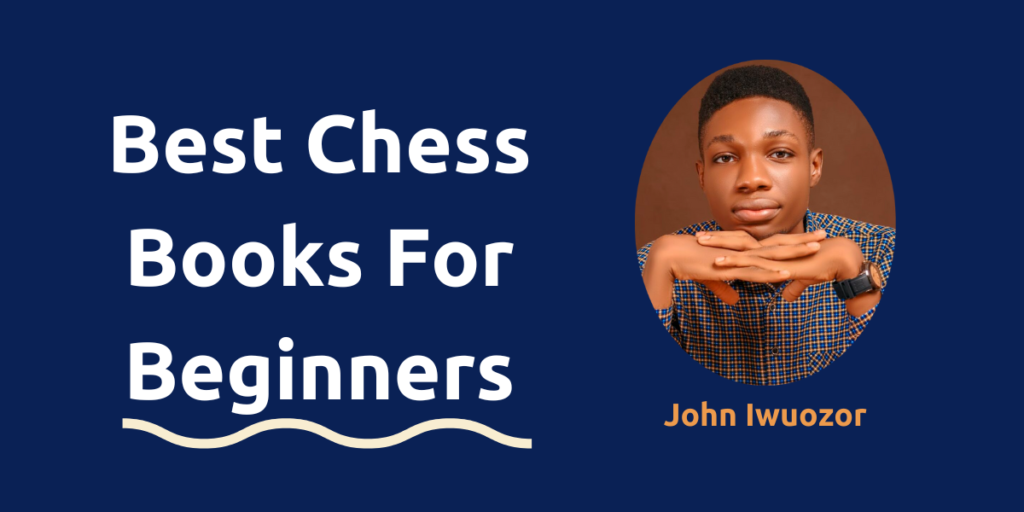In this article, I’ll share with you the top chess books to help you break out of the beginner stage.
If you’re struggling to break 1000 or even 500 rating points, these books can be your lifeline to exponential growth in your chess game.
Let’s get in.
Chess: 5334 Problems, Combinations and Games by László Polgár

To start off, the number one book on my list is “Chess: 5334 Problems, Combinations and Games” by László Polgár.
A Hungarian Grandmaster, Polgar trained all his three daughters from a young age to become chess prodigies – all three of them are now extraordinarily successful players.
And yes, one of them, Judit Polgar, is said to be the best woman chess player of all time.
This a treasure chest of puzzles that guides you through basic chess motifs to complex tactical strategies.
The problems are meticulously organized to progressively challenge your chess skills.

It’s a pretty voluminous book, so, I would suggest solving 50 puzzles a day for a steady growth curve. Just remember to stay consistent for the best results.
Silman’s Complete Endgame Course: From Beginner To Master

Who said endgame was boring?
Those final moments of the game are just as engrossing as the spectacular opening gambits.
This is where “Silman’s Complete Endgame Course” comes to your rescue.
This comprehensive manual unravels the intricacies of the endgame, starting from basic moves to advanced strategies.
The course is divided by level, from the ultimate beginner to Class A player (2200+ rating points).
As Capablanca, Third World Chess Champion once said,
“In order to improve your game, you must study the endgame before anything else; for whereas the endings can be studied and mastered by themselves, the middle game and the opening must be studied in relation to the endgame.”
How to Beat Your Dad at Chess by Murray Chandler

The next book is, “How to Beat Your Dad at Chess by Murray Chandler”.
Yes, the title sounds a bit absurd, but it’s actually a brilliant book for beginners.
The book is centered on basic mating tactical patterns, split into 50 themes, which are shown in diagrams first, and then exemplified in actual game situations.

This book is an excellent foundation for your chess development, emphasizing the importance of tactics early on.
For its simplification of complex themes and its utility for beginners, this book tops my list.
Logical Chess: Move By Move by Irving Chernev

Another recommendation is Irving Chernev’s Logical Chess: Move By Move.
This book is an excellent beginner-friendly introduction to the ideas behind each chess move.
The book’s only downside is its age, resulting in rather outdated game examples.
Despite this, the knowledge of chess history gained from this book will only enrich your understanding of the game.
The Amateur’s Mind: Turning Chess Misconceptions Into Chess Mastery Paperback by Jeremy Silman

For the beginner, understanding common misconceptions about strategy is critical.
Jeremy Silman’s The Amateur’s Mind is top-tier for this purpose.
It discusses the most frequent misunderstandings in a reader-friendly manner, making it an essential read for those just starting their chess journey.
Mastering The Chess Openings 1 by John Watson

Next, we have the “Mastering the Chess Openings” series by John Watson.
These books are perfect for those looking to build their opening repertoire with e4 and d4.
The series comprises four volumes, each focusing on various openings.
Volume 1, in particular, delineates openings with 1. e4, offering an array of choices.
If you’re looking for a simpler opening repertoire, consider checking out ‘Keep It Simple: e4 or d4’ by Christof Sielecki, which also comes highly recommended.
Mastering The Chess Openings by John Watson Volume 2

Here’s another gem by John Watson – Volume 2 of the aforementioned series, with a focus on openings involving 1. d4.
This book provides insight into how to use the black pieces effectively against d4.
You can learn the classic Grunfeld, the bold Benoni, or the robust Nimzo, all according to your chosen playstyle.
The Mammoth Book of The World’s Greatest Chess Games

To round off the list, I have a ‘recap’ book for you – “The Mammoth Book of The World’s Greatest Chess Games”.
This collection throws light on 145 of the most iconic games, enabling you to imbibe the strategies employed by top-rated chess players.
The book simplifies each game, helping beginners understand the thought process behind each chosen move.
Remember, the key to a good games collection book is its simplicity and comprehensibility, so pick something that resonates with your level of understanding.
Final Thoughts
In summary, these are my top five recommendations for anyone looking to improve their chess game.
With persistence, dedication, and the right resources, you’re bound for a winning streak.
If you had to narrow it down to just two picks though, I’d champion Silman’s endgame course and Polgar’s tactical book for their exhaustive yet user-friendly approach.
Let me know if you found this review helpful.
